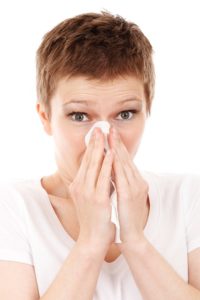Allergies and Diet
 It is very important to remember the body needs to periodically detox for optimum health. We are continuously being exposed to carcinogens, toxins, poisons and free radicals, from the unhealthy food we eat, air we breathe and bad water we drink. This will expedite aging.
It is very important to remember the body needs to periodically detox for optimum health. We are continuously being exposed to carcinogens, toxins, poisons and free radicals, from the unhealthy food we eat, air we breathe and bad water we drink. This will expedite aging.
What’s a non-allergenic diet?
Well, it’s a diet that decreases your level of reaction to external allergens. In other words, it’s dietary changes you can make to help improve your allergies and to help reduce the itchy eyes, runny nose, sneezing and wheezing.
Pasteurized, homogenized dairy products and refined sugar cause the creation of more mucus in the body. Mucus should be thin and runny to help get rid of allergens. When mucus gets thick allergens get stuck in the body instead of being cleared out which causes allergy symptoms to be more pronounced. So limiting both dairy and sugar is one way to help allergies.
Allergies and the Immune System
Allergy is connected to the immune system and inflammation so it makes sense to strengthen this part of the body.
Quercetin is a bioflavonoid, which may have anti-inflammatory and antioxidant properties helpful for allergies. Foods rich in quercetin include green tea, apples, onions, kale, papaya, broccoli and many berries. Eating these foods may lessen the common allergy symptoms.
Vitamin C is a great immune boosting vitamin and is a great addition to meals during spring. Foods rich in vitamin C include bell peppers, dark leafy greens, broccoli, papaya and oranges. The two herbs with the most vitamin C are thyme and parsley.
There are also a number of herbal products that are anti-histamines, which can help reduce allergy symptoms. These include nettle, chamomile, garlic and plantain.

